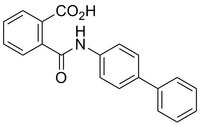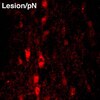420358 Sigma-AldrichCBFβ Activator, Kartogenin - CAS 4727-31-5 - Calbiochem
The CBFβ Activator, Kartogenin modulates the biological activity of CBFβ. This small molecule/inhibitor is primarily used for Biochemicals applications.
More>> The CBFβ Activator, Kartogenin modulates the biological activity of CBFβ. This small molecule/inhibitor is primarily used for Biochemicals applications. Less<<Synonyms: 2-(Biphenyl-4-ylcarbamoyl)benzoic acid
Recommended Products
Přehled
| Replacement Information |
|---|
Tabulka spec. kláve
| CAS # | Empirical Formula |
|---|---|
| 4727-31-5 | C₂₀H₁₅NO₃ |
Products
| Katalogové číslo | Balení | ks/bal. | |
|---|---|---|---|
| 420358-25MG | Skleněná láhev | 25 mg |
| References | |
|---|---|
| References | Johnson, K., et al. 2012. Science 336, 717. |
| Product Information | |
|---|---|
| CAS number | 4727-31-5 |
| Form | White solid |
| Hill Formula | C₂₀H₁₅NO₃ |
| Chemical formula | C₂₀H₁₅NO₃ |
| Structure formula Image | |
| Quality Level | MQ100 |
| Applications |
|---|
| Biological Information | |
|---|---|
| Purity | ≥99% by HPLC |
| Physicochemical Information |
|---|
| Dimensions |
|---|
| Materials Information |
|---|
| Toxicological Information |
|---|
| Safety Information according to GHS |
|---|
| Safety Information |
|---|
| Product Usage Statements |
|---|
| Packaging Information | |
|---|---|
| Packaged under inert gas | Packaged under inert gas |
| Transport Information |
|---|
| Supplemental Information |
|---|
| Specifications |
|---|
| Global Trade Item Number | |
|---|---|
| Katalogové číslo | GTIN |
| 420358-25MG | 04055977187540 |
Documentation
CBFβ Activator, Kartogenin - CAS 4727-31-5 - Calbiochem MSDS
| Title |
|---|
CBFβ Activator, Kartogenin - CAS 4727-31-5 - Calbiochem Certificates of Analysis
| Title | Lot Number |
|---|---|
| 420358 |
References
| Přehled odkazů |
|---|
| Johnson, K., et al. 2012. Science 336, 717. |











